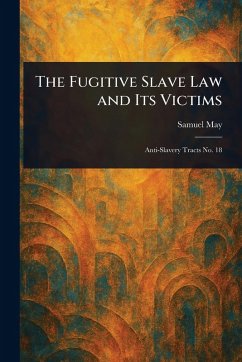"Fugitive Slave Law and Its Victims" offers a powerful indictment of the 19th-century Fugitive Slave Law in the United States. Originally published as Anti-Slavery Tracts No. 18 by the American Anti-Slavery Society, this historical document sheds light on the injustices faced by fugitive slaves and the broader struggle for abolition. This volume provides crucial insight into the era leading up to the Civil War, documenting the impact of the Fugitive Slave Law on individuals and communities. It serves as a valuable resource for understanding the complexities of slavery, the fight for civil rights, and the legal battles surrounding this dark chapter in American history. A vital contribution to the study of African American history and the ongoing pursuit of justice. This work has been selected by scholars as being culturally important, and is part of the knowledge base of civilization as we know it. This work is in the public domain in the United States of America, and possibly other nations. Within the United States, you may freely copy and distribute this work, as no entity (individual or corporate) has a copyright on the body of the work. Scholars believe, and we concur, that this work is important enough to be preserved, reproduced, and made generally available to the public. We appreciate your support of the preservation process, and thank you for being an important part of keeping this knowledge alive and relevant.
Bitte wählen Sie Ihr Anliegen aus.
Rechnungen
Retourenschein anfordern
Bestellstatus
Storno









